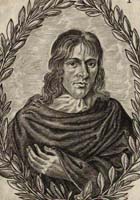John Hall
John Hall Poems
Pray let m' alone, what do you think can I
Be still, while Pamphlets thus like hailstons fly
About mine eares? when every other day
...
MAkes Nature maps? since that in thee
Sh' has drawn an University,
Or strives she in so small a peece
...
Palurus.
MY Antinetta though thou be
More white, then fome wherewith a wave
...
Strange Chimistry! can dust and sand produce
So pure a body and Diaphanous;
Strange kind of Courtship! that the amorous Sun
...
John Hall Biography
John Hall (1627–1656), also known as John Hall of Durham, was an English poet, essayist and pamphleteer of the Commonwealth period. After a short period of adulation at university, he became a writer in the Parliamentary cause and Hartlib Circle member. The son of Michael Hall, he was born at Durham in August 1627, was educated at Durham School, and was admitted to St John's College, Cambridge, on 26 February 1646. Hall remained at Cambridge till May 1647, but considered his real merits unrecognised there. He later entered Gray's Inn. Hall was not initially against the monarchy; but his early views were reforming and utopian. He was much influenced by Baconianism and the chance of a renewal of learning. Blair Worden describes Hall as "elusive" in the period from 1649, but points out parallels with the political development in the views of John Milton. By command of the Council of State he accompanied Oliver Cromwell in 1650 to Scotland. His friend John Davies states that Hall was awarded a pension of £100 per annum by Cromwell and the council for his pamphleteering services. Hall died on 1 August 1656, leaving unpublished works. Thomas Hobbes frequently visited him; another of his friends was Samuel Hartlib.)
The Best Poem Of John Hall
The Call
Romira, stay,
And run not thus like a young Roe away,
No enemie
Pursues thee (foolish girle) tis onely I,
I'le keep off harms,
If thou'l be pleas'd to garrison mine arms;
What dost thou fear
I'le turn a Traitour? may these Roses here
To palenesse shred,
And Lilies stand disguised in new Red,
If that I lay
A snare, wherein thou wouldst not gladly stay;
See fee the Sunne
Does slowly to his azure Lodging run,
Come sit but here
And presently hee'l quit our Hempisphere,
So still among
Lovers, time is too short or else too long;
Here will we spin
Legends for them that have Love Martyrs been,
Here on this plain
Wee'l talk Narcissus to a flour again;
Come here, and chose
On which of these proud plats thou would repose,
Here maist thou shame
The rusty Violets, with the Crimson flame
Of either cheek,
And Primroses white as thy fingers seek,
Nay, thou maist prove
That mans most Noble Passion is to Love.
